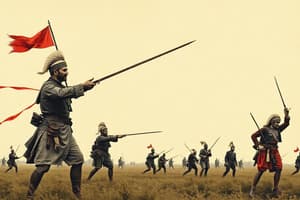Podcast
Questions and Answers
What was the global conflict that the French and Indian War was a part of?
What was the global conflict that the French and Indian War was a part of?
The Seven Years' War
What was the significance of the Ohio River Valley during the French and Indian War?
What was the significance of the Ohio River Valley during the French and Indian War?
It was a region of great strategic importance due to its fertile land and access to waterways for trade and transportation.
What was the Iroquois Confederation and what role did it play in the French and Indian War?
What was the Iroquois Confederation and what role did it play in the French and Indian War?
The Iroquois Confederation was a powerful Native American alliance that played a key role in the diplomacy and military strategies during the French and Indian War.
What was the purpose of the Albany Congress of 1754?
What was the purpose of the Albany Congress of 1754?
What was the Albany Plan of Union and what was its significance?
What was the Albany Plan of Union and what was its significance?
What was the main difference between European warfare and other forms of warfare during the French and Indian War?
What was the main difference between European warfare and other forms of warfare during the French and Indian War?
What is a siege in a military context?
What is a siege in a military context?
How did Native American warfare differ from European warfare?
How did Native American warfare differ from European warfare?
What was the result of the Treaty of Paris in 1763?
What was the result of the Treaty of Paris in 1763?
What is a blockade in a military context?
What is a blockade in a military context?
What was the significance of the Battle of Monongahela in 1755?
What was the significance of the Battle of Monongahela in 1755?
Which battle marked a turning point in the war, with British forces emerging victorious under the command of General James Wolfe?
Which battle marked a turning point in the war, with British forces emerging victorious under the command of General James Wolfe?
What was the role of Benjamin Franklin during the French and Indian War?
What was the role of Benjamin Franklin during the French and Indian War?
Who was the British Prime Minister who significantly influenced British strategy during the war?
Who was the British Prime Minister who significantly influenced British strategy during the war?
Flashcards are hidden until you start studying
Study Notes
The Seven Years' War and French and Indian War
- The Seven Years' War (1756-1763) was a global conflict involving major European powers.
- The French and Indian War (1754-1763) was the North American theater of this war, fought between the British and French, with Native American allies on both sides.
Ohio River Valley and New France (Canada)
- The Ohio River Valley was a region of great strategic importance due to its fertile land and access to waterways for trade and transportation.
- New France, which encompassed present-day Canada, was a French colony that sought to expand its territory into the Ohio River Valley.
Iroquois Confederation and Albany Congress
- The Iroquois Confederation was a powerful Native American alliance that played a key role in the diplomacy and military strategies during the French and Indian War.
- The Albany Congress of 1754 was a meeting of colonial representatives to discuss plans for collective defense against the French threat.
Albany Plan of Union
- The Albany Plan of Union aimed to create a unified colonial government for defense against the French, proposed by Benjamin Franklin at the Albany Congress.
- Although not adopted, it laid the groundwork for future discussions on colonial unity.
Military Terms
- Siege: A military tactic where an enemy is surrounded in a fortified position to force surrender.
- Blockade: The isolation of an area to prevent entry or exit of goods or people.
- Ambush: A surprise attack by concealed forces on unsuspecting enemies.
- Retreat: A withdrawal of forces from a battle or position to avoid defeat.
Native Style of Fighting vs. European Style of Fighting
- Native American warfare often involved guerrilla tactics, hit-and-run attacks, and reliance on knowledge of local terrain.
- European warfare emphasized discipline, line formations, and traditional battle tactics.
Treaty of Paris (1763)
- The Treaty of Paris in 1763 ended the Seven Years' War and resulted in France ceding Canada to Britain while Spain ceded Florida to Britain in exchange for Cuba.
Battles
- Jumonville Glen: Site of an early skirmish that sparked the French and Indian War.
- Fort Necessity: Where George Washington surrendered to French forces in 1754.
- Monongahela: Major defeat for British forces led by General Edward Braddock in 1755.
- Fort William Henry: Surrendered by British forces to the French in 1757.
- Fort Duquesne (Fort Pitt): Captured by British forces in 1758.
- Plains of Abraham (Quebec City): Battle where General James Wolfe defeated General Louis de Montcalm in 1759.
- Montreal: Captured by British forces in 1760.
People
- George Washington: Future first President of the United States who gained military experience during the French and Indian War.
- General Edward Braddock: British commander who suffered a major defeat at Monongahela.
- Benjamin Franklin: Prominent figure who advocated for colonial unity during this period.
- William Pitt: British Prime Minister who significantly influenced British strategy during the war.
- General James Wolfe: British general known for his victory at Quebec City.
- General Louis de Montcalm: French general who led forces during key battles in North America.
Studying That Suits You
Use AI to generate personalized quizzes and flashcards to suit your learning preferences.




